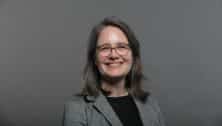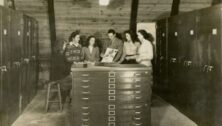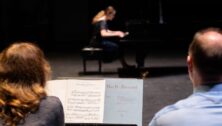Delaware County Leadership: Rich Nourie, Head of School, Abington Friends School
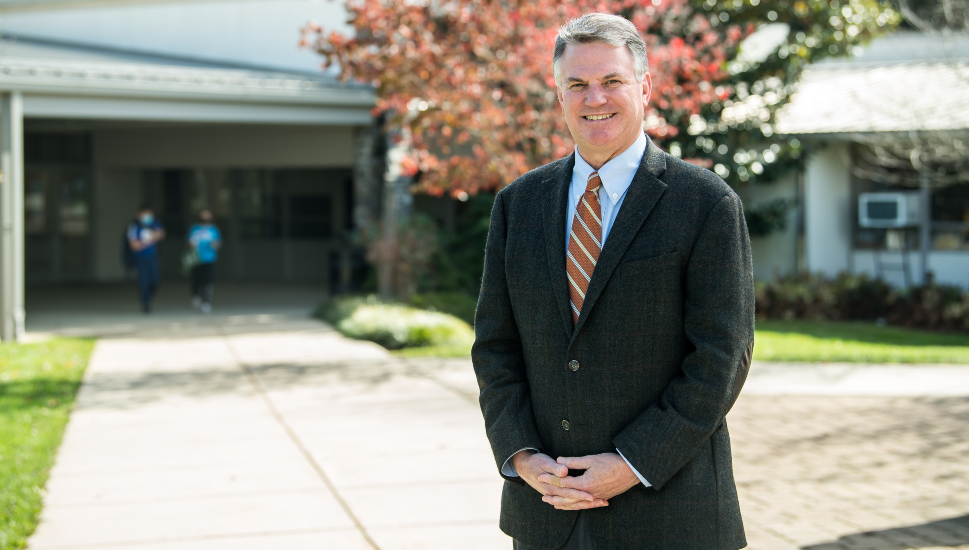
Rich Nourie, the Head of School at Abington Friends School, spoke with MONTCO Today about growing up in suburban Boston; the influence his activist parents, who were very spiritual, had on him; and his ear for music and how it helped with the difficult move to the Philadelphia area his family made when he was a senior in high school.
Nourie also discussed his choice to attend Brown University and major in pre-med before changing his academic path when he became fascinated by developmental psychology and anthropology; his teaching years at a Quaker school in Providence; how his career path led back to Philadelphia, and the challenges and opportunities that lie ahead for Abington Friends School.
Where were you born, and where did you grow up?
I was born the second of five children in 1960 in Providence, Rhode Island, where my parents are from, and grew up in Framingham, Massachusetts west of Boston.
What did your parents do?
My dad was in the corporate world in the insurance business, and my mom was a teacher for a brief time before staying home with us kids.
My dad went to Moses Brown, a Quaker school in Rhode Island. He said at one point that he would have loved to have been a teacher and a coach. That was not my initial career plan growing up, but that always stayed in the back of my mind.
Who had a bigger impact on you, your mom or your dad?
Very much both, and in various ways. Particularly spiritually, my parents both were alive in their life of faith. They were both progressive Catholics, and they sought out communities with their same beliefs.
What did that look like to you – growing up in a house like that?
We had masses in our living room, and several friends who were priests. My parents were part of a spiritual community called the Cursillo Movement. We went to church at the nearby seminary because it was a lively place with a lot of young people, including contemporary music and a jug band. My dad was involved with the homeless community in Boston, and has been faithful in that work for all of his adult life.
What memories do you have growing up in Framingham?
The woods! We built a lot of forts, caught turtles and frogs, went sledding on horse trails in the winter, and explored for hours. It was a time in childhood when we were very free. We were socially independent of our parents during those days, and I think that was profoundly healthy.
Did you play sports?
I was always active. I ran track and cross country and played tennis in high school. I played middle school and freshman football. Once I got to high school, the other players were a lot bigger. I wanted to quit in the middle of the season, but my dad wanted me to play out the season because of the commitment I had made but I was done after that.
I went to an all-boys Catholic high school in Massachusetts. I ran the 800 meters outdoors and the 600 meters indoors.
Did you listen to music back then?
I always had an ear for and love of music. My parents got a piano when I was in fourth grade which I started to play right away. In middle school, my older sister’s boyfriend, who was a talented musician on the piano and guitar, showed me how chords work and that blew the whole world open for me. To this day, I still love to play guitar and the keyboards. I am in a trio, and I play and sing as a cantor at my church. All my best friendships have been around music, and my kids play as well.
Music is the language of emotion. It’s a language beneath language.
What kind of music do you enjoy playing?
I play singer/songwriter stuff, folk-rock, blues, a little bit of jazz. I do enjoy playing gospel and sacred music. Church music is wonderful because you’re setting the tone for worship. The emotional range is vast – everything from big statements of awe and transcendence to the quieter, more reflective pieces.
What’s the best concert you’ve ever been to?
When I was in my twenties and thirties, I was playing shows a lot in a couple of bands in RI and so didn’t go out to see a lot of live music for a while. But here in Philly, I’ve loved seeing folks like the Wood Brothers, Josh Rouse, and Martin Sexton in great venues like World Café Live.
Did you have a favorite concert experience that you were playing?
My very first concert was the hook. In eighth grade, I had a band, and we went to the principal asking if we could play a student assembly for my large public middle school. The assistant principal told us that we could play if we got the teachers to sign a petition.
It was 1973, and while we were all listening to rock music, none of us had ever been to a rock concert. Our assembly was the first rock show for our peers, and they went nuts. The energy was amazing. We finished the first song, and the place erupted! I had a wonderful group of guys that I played with in high school too.
You weren’t joining bands; you were organizing them.
I have enjoyed all roles. Right now, I’m leading the trio that I’m in, but I’ve been a sideman too, and I love that role.
What leadership skill set did you have?
I think it’s a couple of things. My definition of musical talent is that you can’t help but play. That was my thing. I just loved to play music. What’s remarkable about music is that you’re not just hanging out together; you’re creating something together. You’re perfecting it together, and then you get to bring it out to the world. It’s an infectious love.
Bill Evans, the great jazz pianist, had a piece of advice for musicians, which was “don’t worry about fluency. Do difficult, technical things and the fluency will follow.” What I found was, if you play all the time, and you’re trying to figure something out, you get better. Music develops as a language. In my musical life, we don’t use much written music. We don’t remember all the songs; we play by ear and improvisation. You learn to just connect your ears to your hands.
One of the things I love about my current trio is that there is so much room for each of us to play and create an intimate sound together. You create a tone and environment for being together. There’s something about that shared energy that is very gratifying and meaningful.
Did you work at all in high school?
Of course! My first job was as a stock boy at the MediMart, a chain drug store, which paid $2.30 an hour. I loved the concrete responsibility of it. I appreciated having independence and a little bit of financial independence. It was a very important part of my high school experience. I also worked at a McDonald’s.
What lessons did you take from those jobs that stay with you today?
I watch adolescents who have jobs today, and I think it’s so important for them to be in an adult setting, where they have the experience, responsibility, and accountability of being counted on. The work itself doesn’t need to be inherently meaningful, but it should make them proud. My son worked at Manhattan Bagel, and he took a lot of pride in his work even if was just about bagels.
Where did you go to college and why there?
My parents moved to Philadelphia for my dad’s job during my senior year of high school, which wasn’t so great for me. It worked out fine in the end, and I have music to thank for that. I found some great musicians at my new school, Archbishop Carroll, and started playing a lot of guitar.
I was eager to get back to Massachusetts and went to Brown for college. I didn’t look at too many schools. I went there because I loved the open curriculum at Brown, as well as the lively sense of what your education should be in college. There was a great musical community there.
Looking back, was Brown the right choice for you?
Yes and no. Intellectually, it was. I was among a group of peers who loved reading and writing.
The open curriculum was a mixed experience because it required a robust advising system, which didn’t really exist. Unlike students here at our school, I didn’t get to know teachers on a significant level until I was a senior. I might have gotten more out of the experience if I had. Outside of class, I focused on playing music and would hitchhike on weekends to see my girlfriend in Northampton MA.
What’s the furthest you’ve hitchhiked?
My roommate and I hitchhiked from Providence to Brooklyn. That took about four hours. I remember we set out on a beautiful fall day, and our first ride was from a pick-up truck. We laid in the back of the bed and just looked out at the gorgeous scenery and felt incredibly free.
My mom actually started my hitchhiking career. In 9th grade, I left the public middle school for the all-boys Catholic school about thirty minutes away, and I was the only kid from my town who went there. One day I missed the bus, and I walked the mile back to our house to tell my mom, to which she replied, “you can hitchhike.” It was one of those moments of independence.
Did you start in a career in education, or did education find you?
It was a mix. I started college pre-med because back then if you were a good student, that’s what you did. I quickly found out that it wasn’t for me. From that major, I became fascinated by developmental psychology and anthropology. I was fascinated by learning how the mind works, and how do we make sense of things. Anthropology was everything I always wanted history to be – trying to make sense of how people lived, how culture creates thought, and vice versa. I fell in with the psychology department at Brown, which made me interested in the academic psychology question of how kids learn.
I worked for a year with autistic children before interviewing for a teaching job at Moses Brown, the Quaker school that my father went to. I didn’t get the job the first time I applied, but the Head of School called me back the following spring.
When he initially turned me down, he told me that I had come across as too sure of things. It was funny in a way because my dad, coming from the corporate world, encouraged me to be really confident in the interview, which I guess I overdid. But the headmaster said they weren’t sure that I understood what it meant to be a teacher because teaching is something you never master. He called me the following spring to offer me a position in their middle school. I taught there for ten years.
Did you get in there and realized you didn’t really know how to teach?
Absolutely, and there’s something great to that. I’ve worked with beginning teachers for some time now. One of the things we talk about is how we try to begin teaching as a composite of our favorite teachers and who they were for us. And we believe that teaching is about sharing our well-developed understanding with our students so that it can become theirs as well. But that’s not what teaching actually is.
Several shifts and a lot of growth happen over the first two years of teaching that are important to crafting and developing your own voice and repertoire as a teacher. You move from watching yourself teach in a performative way to watching your students learn and creating a learning experience that will move them forward. That shift is significant.
After ten years teaching, I went to grad school looking for my next stage of growth. I continued to study developmental psychology in both adults and children, which led me to Philadelphia and a position at Germantown Friends overseeing the faculty professional growth and the academic program as a young first-time administrator.
What did Germantown Friends see in you?
I’m not sure, but maybe a couple of things. I have a deep passion for Quaker education. I like to say I’m “Quatholic.” Quakerism is very appealing to me as a Catholic; this idea of the fullness and potential of who we are as human beings is the foundation for an educational community. The central insight to Quakerism that I find to be so motivating from an educational perspective is the idea of “continuing revelation,” which means we constantly can learn and grow into a better understanding. When translating that to Quaker education, it’s the idea that our understanding of anything at all is incomplete but can be made more complete.
In our school, we talk about three ways to teach children to deepen their understanding. One, it’s a resource-rich world. We want to teach kids to be resourceful learners by going out and connecting with others who can provide more perspective and help us to do high-quality work.
Secondly, skilled collaborative inquiry. We have a very diverse group in the school. We use multiple perspectives to figure things out, challenge assumptions, find blind spots and come to a clearer, deeper understanding.
The third is silence and reflection. When we go to the meeting house once a week for forty-five minutes, the students quiet themselves and this allows perspective and insight to emerge. Those three items create a powerful set of experiences and skills.
How did you get from Germantown Friends to Abington Friends?
I was at Germantown Friends for eleven years. I had a wonderful mentor named Dick Wade, the head of school, who suggested I meet with the senior faculty regularly to hear and understand their perspective. I got to know that group of teachers very well, and it helped me get to know the school’s culture better. One of my leadership roles was to assist in the transfer of stewardship from the old lions, those who had been there twenty-plus years, to the younger generation of teachers who were coming up.
When Dick went on sabbatical, I filled in as Head of School for six months. The position at Abington Friends came up, and I wasn’t sure about moving to a new school. As a bit of a city snob, I had misconceptions thinking that school would be suburban, rich, white, insular, and coddled. None of these turned out to be true.
I was invited to speak to the AFS faculty about Quaker schools as religious diverse, spiritual communities. I met the faculty, and I ended up coming back to speak to the students soon after, both of which were wonderful experiences. And so, I just finished my sixteenth year here. The community is a great example of the fullness that a Friend’s school can be. It’s profoundly diverse: racially, socioeconomically, and geographically, likely one of the most diverse schools in the 130 independent schools in the Philadelphia region. We learn from that diversity every day.
Looking forward, what are the challenges and opportunities facing Abington Friends?
Coming out of the pandemic, we are intent on rebuilding a deep sense of community and connection for our kids. For these kids, our age range is from three to seventeen years old; they just had sixteen months of the pandemic.
Their lives have been defined profoundly by this disruption and sense of isolation. So many things that are wholesome and nourishing for kids have been in limited supply. Our first focus is thinking about what that re-entry looks like.
Secondly, we are on the cusp of putting out a new strategic plan with some exciting ideas. We don’t want our education to be transactional; we want it to be experiential and transformational.
Our plans include a focus on building equity and justice in our community and in the larger world, creating both challenges and supports that create a sturdy sense of self in children, a wide range of experiential learning programs that create adventure and transformative learning for students and support of teachers in their work of programmatic research and design.
Over the past several years, we’ve formed several experiential programs for students called our Ex programs. We are pairing small groups of students with doctors, lawyers, chefs, entrepreneurs, and more for mentoring and learning opportunities.
This past year we introduced Farm Ex, which has included bringing tens of thousands of bees to campus this year, and a serious program for growing food on campus for students. The program weaves together themes of understanding farming and the agricultural industrial complex, environmental issues, social justice dimension of food insecurity and links to food distribution networks and urban farming in our region.
It is a great example of the power of experiential learning to be multidimensional and interdisciplinary. We eagerly looking ahead at the growth in these experiential programs at AFS.
What impact does that have on the kids’ education?
A profound one. It’s like the summer job phenomenon, only much more intentionally connected to growth. We have an outstanding academic program that provides excellent preparation for college. But our educational vision is far more ambitious than that. We want students to experience education as revelatory in the here and now, helping them makes sense of the sometimes tumultuous world around them with a sense of hope and personal purpose.
We want them to understand that they have a vital and constructive role to play both every day in this school community and in the lives ahead of them, a role that will make the most of and fulfill their unique gifts. And we want them to develop here a strong sense of self and well-being that will ground them in the world of continuous change that they will inherit.
Do you still feel challenged after 16 years?
Absolutely. Education is wonderfully challenging. It’s a very human enterprise. The world keeps changing. The kids face issues that we never had to face, and we need to find ways to help them navigate them.
I benefit from connection to a tremendous group of head of school colleagues in this region. I just stepped down as Chair of the Board of Association of Delaware Valley Independent Schools (ADVIS) and I treasure those connections.
What do you do with your free time?
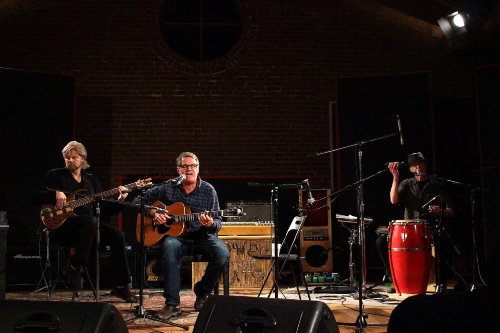
We are now empty-nesters, and I have to say, it’s fabulous. I tell people that Robin and I started as a couple, ran a circus together for 25 years, and now we are a couple again.
Unlike other empty nesters, because we work in schools, we’re still in the world of childhood – while our house stays neat and the food stays in the refrigerator. Our kids are in wonderful places. We have a two-year-old grandson and another grandchild on the way.
I still play music of course and my wife and I both love to read and travel.
What’s the last book you read?
I read a lot of fiction. Right now, I’m reading Hamnet, a fictionalized story of Shakespeare’s family. It was beautifully imagined.
Finally, Rich, what’s the best piece of advice you’ve ever received?
My parents set an example for us by seeking out a spiritual life. I can still hear my mom saying, “God is good.” She also made it very clear that our primary identity was as children of God. One of the things that contemplatives believe is at the core of each one of us is an inexhaustible source of strength, peace, and perspective that we can never be separated from, no matter the circumstance. My parents lived that ideal.
One thing that they did, and that I try to do too, is constantly read and learn. My parents read the contemplatives. They read the lives of the saints. They were actively talking ideas about spirituality and were part of multiple communities.
My dad worked with the homeless. He was a founding board member of the Independent Mission Schools in Philadelphia. When my parents lived in Strafford in Delaware County, they went to a parish in North Philadelphia – St. Malachy’s Parish and School with Fr. McNamie.
When 16 neighborhood Catholic schools were closing, he was part of the group that turned them into independent schools that are thriving today.
They both lived a life of growth and new learning. My dad grew up a mainstream, conventional Republican who became a passionate advocate for marginalized people. He’s 88 and still active and an inspiration to me today.
_________
Publisher’s Note: Laura Manion Contributed to this profile.
Join Our Community
Never miss a Delaware County story!
"*" indicates required fields
























![95000-1023_ACJ_BannerAd[1]](https://delco.today/wp-content/uploads/sites/3/2023/03/95000-1023_ACJ_BannerAd1.jpg)



